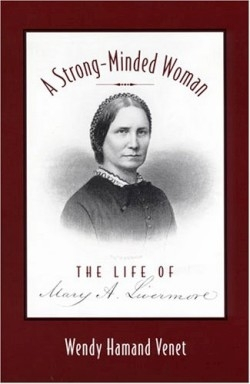A Strong-Minded Woman
The Life of Mary Livermore
Upon her death in 1905, Mary A. Livermore was hailed by the Boston Transcript as “America’s foremost woman.” It was a fitting epitaph. During the Civil War, Livermore worked tirelessly to ensure proper nutrition and medical care for Union soldiers. She was a gifted journalist and orator, and commanded private audiences with Abraham Lincoln and Ulysses S. Grant. At the peak of her thirty-year career, her reputation as a champion of women’s rights rivaled, and perhaps even surpassed, those of Elizabeth Cady Stanton and Susan B. Anthony. One hundred years later, the fact that few, if any, Americans have even heard of Livermore is both a testament to her complex character and to the fickle forces that shape celebrity.
The author’s latest book marks the first full-length study of Livermore’s life, a fact due in part to the difficulty of the task. Wary of posthumous biographers who might tarnish her reputation, Livermore burnt all her personal correspondence before she died. Venet nevertheless succeeds in crafting a remarkable piece of research by drawing on Livermore’s two autobiographies and her numerous articles and speeches. Anyone with an interest in American history or women’s history will delight in this fascinating behind-the-scenes look at the incipient U.S. feminist movement and one of its brightest stars.
Venet first developed an interest in her subject as a graduate student of history at the University of Illinois. Her research on the role of women in the Civil War resulted in her first book, Neither Ballots Nor Bullets: Women Abolitionists and the Civil War (University Press of Virginia, 1991). In 1997, she co-edited the anthology Midwestern Women: Work, Community, and Leadership at the Crossroads (Indiana University Press). A book review editor for the academic journal The Historian, Venet is a full-time professor of nineteenth-century U.S. History and American Women’s History at Georgia State University.
At a time when women could not attend college nor lay any legal claim to their own income, Mary Livermore campaigned for women’s acceptance into the Universalist ministry and won. She deplored the dire working conditions in dress factories and celebrated the first woman admitted to the Philadelphia Typographical Union. But her progressivism was not without limits. Raised in a strict evangelical household, the Boston native was slow to embrace social liberalism and in some ways never fully did.
Throughout her life, she remained a staunch critic of alcohol consumption and supported the wearing of moderate corsets. Although such antiquated values may have contributed to Livermore’s fading legacy, they also add depth to her biography. More than just a figurehead for a cause, Venet’s Livermore emerges as a living, breathing woman who both succumbs to and surpasses the times in which she lived.
Reviewed by
Aimee Sabo
Disclosure: This article is not an endorsement, but a review. The publisher of this book provided free copies of the book to have their book reviewed by a professional reviewer. No fee was paid by the publisher for this review. Foreword Reviews only recommends books that we love. Foreword Magazine, Inc. is disclosing this in accordance with the Federal Trade Commission’s 16 CFR, Part 255.

